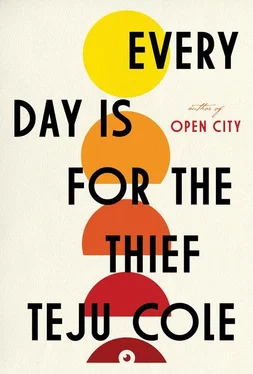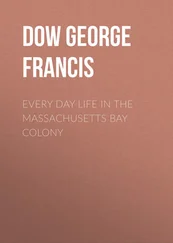— When did they tell you he was dead?
— Not until we got home. It was unreal, you know. Sometimes it is still unreal, that Sola could just die like that. Just gone like that. I was all alone. And that was the last time I was ever in Abeokuta. I transferred to a day school in Lagos the next semester.
We park the car outside the compound and Rotimi switches the engine off. We sit. We hear only the sound of the neighbors’ generators.
— To be honest, my mother almost went mad. There was a lot of silence in the house for the first year afterward. It was unbelievably hard for all of us. For each one of us, in a different way.
— I can imagine. And now?
— We’re fine. Mostly. They’re overprotective, of course, but I understand. Even when I don’t want to be too careful, I have to think about them and I force myself to be careful. Just for them if for no other reason. Once I told them I had ridden on a motorcycle. My dad almost slapped me. And, you know, he kind of had a point.
We both laugh. I take the diesel out of the trunk, and wipe my hands on a rag.
— Ol’ boy, thank you so much for all this driving around.
— What nonsense. Don’t mention it. I’m so happy to see you. It’s been too bloody long.
— It was a good time, my friend. Stay in touch, okay? Let me know how I can help. Especially when you decide to take those American licensing exams. Don’t hesitate, use my mailing address, have me send you forms, whatever it is. The program I’m in is quite small, but there are always opportunities in New York.
— Most definitely.
He smiles, hugs me as if he were comforting me. He gets into his car and drives away, waving the whole time. And, because it is night, my mind continues to trace alternatives.
The field I am standing in is mostly dust, but it has sere grass in scattered patches. Six men sit in the shade of a large Indian almond tree. One of them, a young man in a sky-blue cap, is blind in one eye. For some reason, I keep thinking his damaged eye is rolling over to look at me. It is hot and nobody talks. Ahead, near the wall that demarcates the field, a black goat grazes. The grass is so low and rare that the goat kneels on his front legs and eats in an angled position. He chews at one patch and shifts around on his knees and eats from another. Head to ground, rump raised in the air, outlined starkly against the off-white wall, he looks like a plane about to land.
It is a school field but quiet because the children have all gone away on Christmas break. It is late afternoon. We are waiting for a container. My aunt built a school on the outskirts of Lagos in the late eighties. She spends all her money on keeping it supplied with resources so that it can compete with the many other private primary schools in the city. Uncle Tunde’s brother had, in October, filled up a medium-size container in Chicago and sent it to Lagos. The shipment contains books, personal effects, and a car. The car is a three-year-old Honda Civic. It is one of the cheapest of the four-door sedan cars on the American market, but nonetheless a fine car to have in Nigeria. The container arrived in Apapa only in the third week of December. But the field in which we are waiting is not at my aunt’s school. This is an older school belonging to their family friend Mr. Wuraola. They have decided against sending the container all the way across Lagos. Instead, they plan to off-load the container at Mr. Wuraola’s field in Surulere and then use small school buses to carry the goods to Ojodu. The reason for this is to avoid attracting the unwanted attentions of hoodlums in the neighborhood, for whom the sudden appearance of a large container might be an invitation to robbery.
There is a Yoruba word: tokunbo . That is the term for the secondhand imported consumer goods that flood the Nigerian market. It means “from over the seas.” This word is also a Yoruba first name, given to those who were born in foreign countries before being brought back home. That is the primary use of the word, but the other sense, the adjectival one, has become common. Tokunbo cars, tokunbo clothes, tokunbo electronics. A word that was once a mark of worldliness now has a mildly pejorative air about it. The importation of used goods is vital to the domestic economy in Nigeria, as the manufacturing industry is not well developed. But in addition to those goods destined for the market, there has also been a steep rise in imports by private citizens for personal use.
Our wait in the field in Surulere is only the latest in a long series of delays. Already, hundreds of dollars have been spent on bribes and unofficial taxes. The previous day, we received a dressing-down from a customs officer at the port who was enraged that his colleague had left him out of the take. And the container is two weeks late. Two weeks and four hours. Then it arrives. Godot is here, says my uncle. Godot’s been rigged to a flatbed trailer, brought through the highways and winding streets from Apapa to Surulere. The trailer pulls into the field. The black goat stops eating and looks up. He gets to his feet and goes away, through the main gate. We don’t see him again. The men under the tree get up from their half slumber. The container is opened quickly, and we started unloading it. We begin with the smaller boxes and work in a chain to transfer them from the container into the little vans. Many are schoolbooks for the various grades. Others contain everyday objects like dish soap, parboiled rice, and lamps. Aunty Folake and Mr. Wuraola supervise the work. Mr. Wuraola, with his red T-shirt tucked into his khakis, looks exactly like a middle-aged American.

When about half of the boxes have been brought down, the driver of the trailer and his assistant set up a winch and an incline. One of the school bus drivers gets inside the Civic and very gently eases it out of the container down into the field. It gleams, looks as good as new compared to the other cars, which have suffered the streets of Lagos. That is when they come in. Three of them. Even from the distance it is obvious that this is trouble. We stop arranging boxes. Two of the drivers immediately go to the far end of the field to meet them and to keep them from getting too close to us. Mr. Wuraola turns to his workers and says:
— How did they get in? How did they get in?
We all look at each other. Our hands hang limp at our sides. Mr. Wuraola paces near the car in his khakis and red T-shirt. Aunty Folake says:
— But what do they want?
Mr. Wuraola says:
— How did they get in? I told you men to keep the gate closed.
— It was closed, sir, says one of the drivers, but it wasn’t locked. They must have reached inside and undone the latch and removed the padlock.
The three of them look in our direction and start moving past the men who have gone to meet them. When we are within earshot they stop and one of them raises his voice:
— Eyin ti l’owo, awa naa gbodo l’owo . You have become wealthy and we must become wealthy too.
Area boys. Unemployed youth in Lagos neighborhoods, notorious for exacting fines and seizing goods. They operate in gangs and report to a godfather. The city is full of them, and no laws of the land or of human decency apply to them. It is also well known that, at intervals, the police murder numbers of them and deposit their bodies in the lagoon. Every Lagosian has stories about the area boys. It is well known that no one can win an election in Lagos without their support. Mr. Wuraola says softly to my aunt:
— They are only after money. What they do is follow the containers all the way from Apapa to wherever they go, and then they demand money. They did the same last year when I brought in a shipment.
Читать дальше













